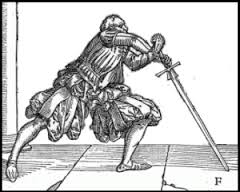Schranckhut
| (2 intermediate revisions by one user not shown) | |||
| Line 2: | Line 2: | ||
==== AKA Cross Guard/The Cross ==== | ==== AKA Cross Guard/The Cross ==== | ||
| − | + | ==== AKA Eisenport (Italian Terminology) ==== | |
| − | [[File: | + | [[File:schranckhut.jpeg | center]] |
One of Meyer's secondary guards, this is a low side guard in which the point of the sword is directed to the ground | One of Meyer's secondary guards, this is a low side guard in which the point of the sword is directed to the ground | ||
| − | In Meyer's variant of the barrier guard the left leg is forward in a forward weighted [[posture]] and the blade is held with crossed hands, point down and slightly to the side. He often refers to the guard as the "cross guard" or "the cross" within the text. | + | In Meyer's variant of the barrier guard the left leg is forward in a forward weighted [[posture]] and the blade is held with crossed hands, point down and slightly to the side. He often refers to the guard as the "cross guard" or "the cross" within the text, and also describes this position as the Italianised version of the [[eisenport]], though claims this usage is clearly wrongheaded. |
The schranckhut is a natural start/end point for techniques such as [[krumphauw]] and [[glutzhauw]] and a transitional point for handworks such as the [[zirckel]]. | The schranckhut is a natural start/end point for techniques such as [[krumphauw]] and [[glutzhauw]] and a transitional point for handworks such as the [[zirckel]]. | ||
NOTE: in other classes the schranckhut is somewhat different; in the 'orthodox' version of a barrier on the left (schranckhut links), the right leg is forward, the pommel held with crossed hands in front of the body, sword pointing down to the left and slightly forward with the false edge up. Schranckhut rechts has the left forward, hands uncrossed in front, and point down to the front right with the long edge up, though this conforms more closely to the [[nebenhut]] described by Meyer. | NOTE: in other classes the schranckhut is somewhat different; in the 'orthodox' version of a barrier on the left (schranckhut links), the right leg is forward, the pommel held with crossed hands in front of the body, sword pointing down to the left and slightly forward with the false edge up. Schranckhut rechts has the left forward, hands uncrossed in front, and point down to the front right with the long edge up, though this conforms more closely to the [[nebenhut]] described by Meyer. | ||
Latest revision as of 06:08, 23 June 2016
[edit] Barrier Guard
[edit] AKA Cross Guard/The Cross
[edit] AKA Eisenport (Italian Terminology)
One of Meyer's secondary guards, this is a low side guard in which the point of the sword is directed to the ground
In Meyer's variant of the barrier guard the left leg is forward in a forward weighted posture and the blade is held with crossed hands, point down and slightly to the side. He often refers to the guard as the "cross guard" or "the cross" within the text, and also describes this position as the Italianised version of the eisenport, though claims this usage is clearly wrongheaded.
The schranckhut is a natural start/end point for techniques such as krumphauw and glutzhauw and a transitional point for handworks such as the zirckel.
NOTE: in other classes the schranckhut is somewhat different; in the 'orthodox' version of a barrier on the left (schranckhut links), the right leg is forward, the pommel held with crossed hands in front of the body, sword pointing down to the left and slightly forward with the false edge up. Schranckhut rechts has the left forward, hands uncrossed in front, and point down to the front right with the long edge up, though this conforms more closely to the nebenhut described by Meyer.
